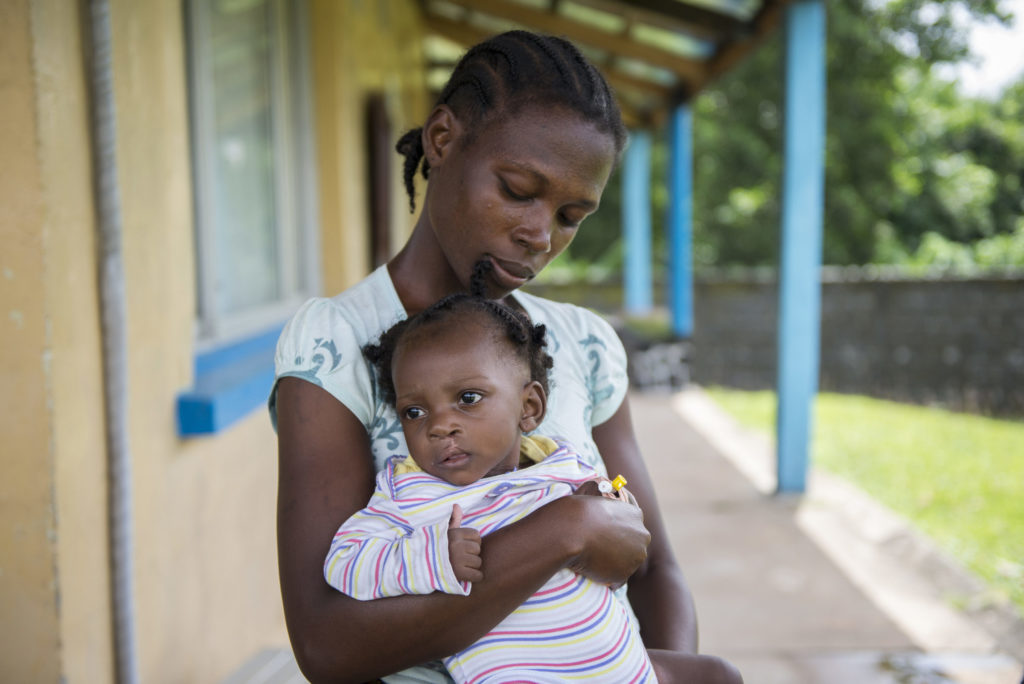I visited Dr. Jerry Brown in Liberia, on assignment for the world’s largest cleft charity: Smile Train. The stories he told me were beyond my imagination. Read about how this African doctor became a game changer in the fight against Ebola, and how he now helps children born with a cleft to regain their smile.
Not far from an idyllic beach on the Atlantic ocean, on a 130-acre campus outside of Liberia’s capital, Monrovia, a colorful set of small buildings are home to the 50 bed Eternal Love Winning Africa (ELWA) Hospital. Also included, are a 400 student, Christian elementary school, a youth camp and the first Christian radio station to be established in Africa, which has broadcasted the gospel throughout Liberia, and neighboring countries, for more than 57 years. At the time of this interview, staff was preparing to move to a new building nearby, with greatly improved and modern infrastructure.
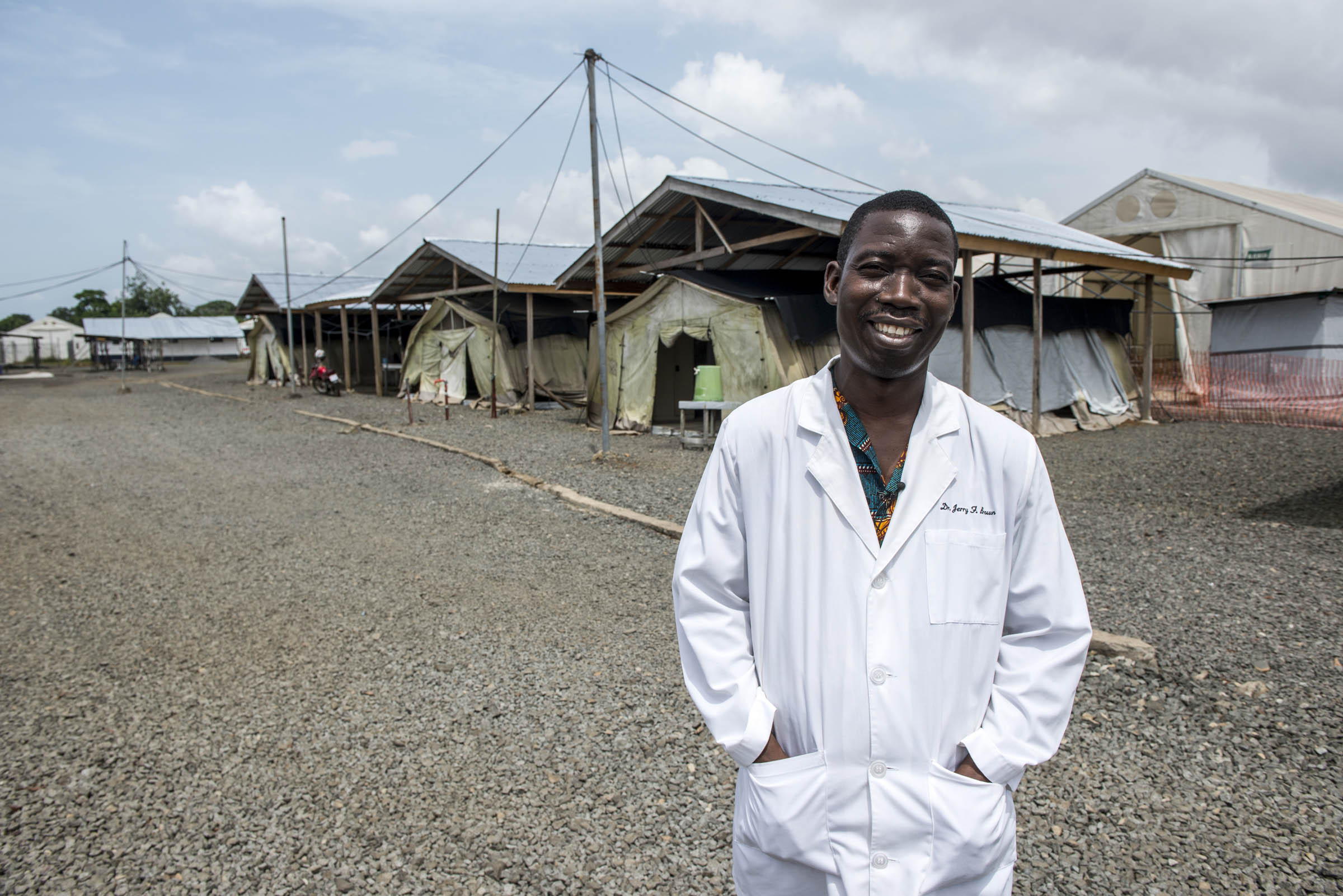
Dr. Jerry Brown from Monrovia poses in front of the former Ebola Treatment Unit.
Dr. Jerry Brown is the Medical Director of the ELWA Hospital and one of the very few general surgeons serving the hospital. “I was involved in the fight against Ebola during the outbreak in Liberia, where I headed the ELWA 2 Ebola Treatment Unit, and I was featured in TIME magazine as “Person of the Year” because of our efforts during the outbreak.” We asked him to recall the Ebola crisis in 2014 and tell us about what he went through. “Personally, I was simply happy to save lives. As a healthcare provider, I think our first goal is preventing people from getting ill and helping them to recover from their diseases. I was happy to be involved and happy to have survived the epidemic in Liberia.”
Because of the nature of the Ebola virus, insufficient research has been done so far to fully understand it. The situation Dr. Brown and his team faced during the outbreak was tragic. “It has been difficult. People quit their jobs because of fears about how easy it was to contract the disease and die. Initially, the biggest challenge was to find personnel who were willing to go to the isolation units. I received a lot of insults because of this. There was a lot of fear and panic among the staff but as time went by, I began to discover a few facts about the disease; how one could protect oneself to safely treat patients and how one could create a safe environment for other colleagues. We developed our strategy, and it worked.
“Collaboration with our international partners was a great help. We never really had anything like an intensive care unit or an isolation unit and the one we had built was the only isolation unit in the capital. This was the infrastructure we had to deal with. Even basic protective gear, for treating the patients, was not available. Production of such materials in Liberia was out of the question, so we had to rely on international help where protective gear was flown in from other countries before we could even get started. Whenever we ran out of materials, again it was a challenge to ensure protection. People had to come up with other strategies to ensure basic care for infected patients and because these processes were slow, it was a big challenge to get started.
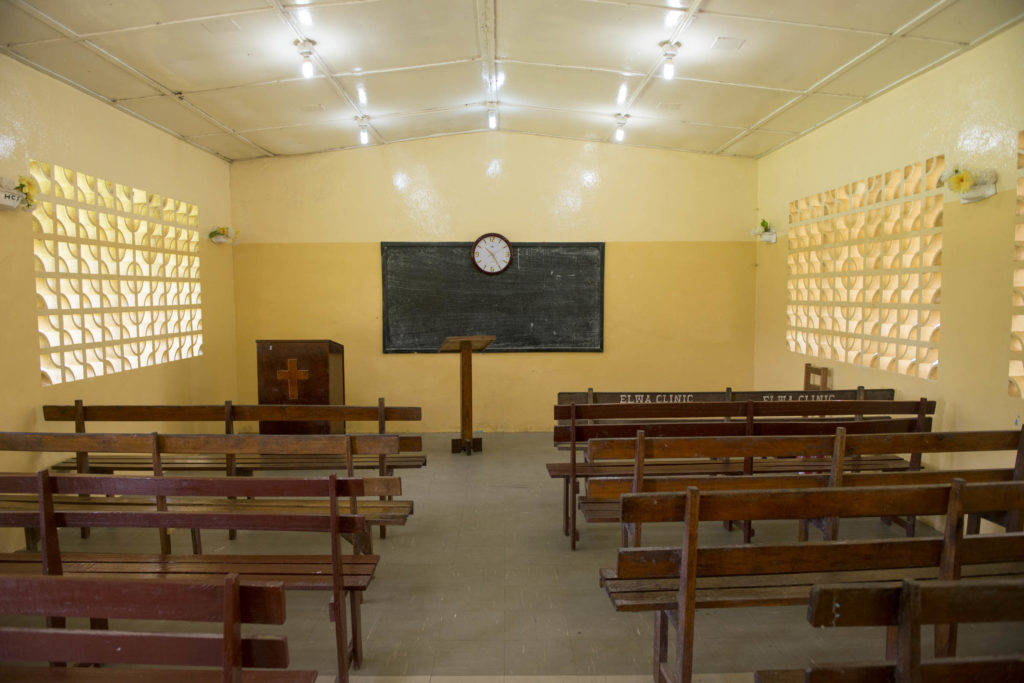
“Another challenge we had, was the lack of any diagnostic ability”, says Dr. Brown. “We could have saved many more people with the appropriate diagnostic tools and we were treating patients based only on an assessment of their symptoms. People have varying incubation times, so for me as a physician, this was very difficult to manage.”
Dr. Brown quickly developed an instinct on how to identify a possible Ebola case, just by looking into a patient’s eyes. “I would look at the person, at his general condition, and if something told me this was an Ebola case, I would immediately order personnel to isolate the patient and not to touch him or her.”
“Ebola has a satanic power. It grabs you with claws like the devil. I saw colleagues not willing to listen to their instincts and to succumb because they were not careful enough. Ebola also does strange things with your body”, says Dr. Brown, “for example, changing the color of the iris in your eye.”
During the climax of the outbreak, as more and more infected patients were brought to the hospital, Dr. Brown recalls how he found himself at a turning point. ”One of my nurses, Barbara, turned out to be infected with the virus. I looked at her and didn’t know what to do. All I could say was, “Barbara, you are not going to die, you are going to live.”
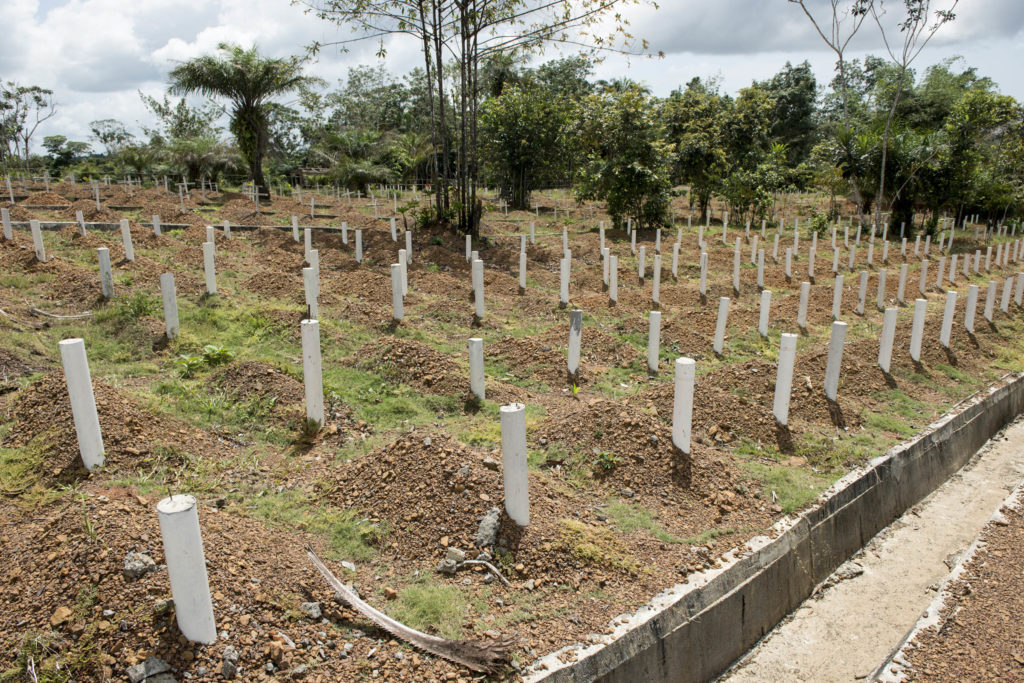
“We had used the Hospital’s chapel as an isolation unit for infected patients and one morning I found myself in a room with the remaining medical personnel. All the international staff had left the hospital and I was the only doctor left in ELWA. They asked me, “Now that everyone has left, will you leave us too?” That was an important moment for me. I felt the obligation of not letting them down. Something inside me changed and I decided to stay. I decided to fight aggressively with all of my power, to help patients survive Ebola. So I started researching and studying every night between midnight and three am. Intuitively, I developed a mix of drugs and infused patients with plenty of fluids to keep them hydrated. I believe the instructions for these drug combinations came from God, in the form of enlightenment.
“And then even my cook got Ebola, through her husband who had been to a secret burial and didn’t tell anybody. His wife would take care of him at night and cook for us during the day. So I had to isolate her and put her through the same therapy as Barbara.
“I would also give to all medical personnel and to my family members, a daily dose of selenium, which is known to boost the immune system. When the immune system is functioning well, resistance to infection is high. My ideas and my drug combinations started to show results. And the preventive measures also seemed to work, as nobody from my family or from the personnel became infected. Many of the patients were starting to show positive results and ultimately, my nurse Barbara also survived.”
As time passed and the staff saw that the preventive measures developed by Dr. Brown allowed them to work safely with Ebola-infected patients, things became a little easier. “Initially it was like walking into an ambush”, says Dr. Brown, “but then it got easier because people understood how to properly protect themselves from the infection. “Many journalists and many people have asked me why did I stay, and where did I find the strength to stay and fight? I believe that what kept me alive were my prayers and the prayers of others. Every day I would receive calls from relatives, friends, and colleagues who prayed for my well being or organized mass for us. They would call me and say, “Dr. Brown are you good? You are in our prayers.” That was all I needed.
“God preserved my family and me because I think there was a divine hand upon me and I know that my assignment is just beginning. It’s something that the world needs to know; that what God did in Liberia through me is worth celebrating and we shouldn’t just sweep it under the carpet. There is a need for more research on what we did. It wasn’t rocket science, just multivitamins and the selenium that you can buy over the counter.
“Liberia still needs to overcome great challenges”, says Dr Brown, “and they can be summarised as staff shortage, lack of qualified staff at post graduate level, poor salary structure and lack of facilities and necessary equipment. Currently in Liberia, there is only one post-graduate school, which was established just a few months before the Ebola outbreak.
“With regard to any medical specialization, people need to be trained outside the country. We were hit by a deadly, infectious disease and we had no specialist to refer to. So that was the problem. During the Ebola outbreak, we found ourselves in a position where there were very few scientists and researchers. There were, at most, five people, in the whole country, we could count on to help us at the time of the outbreak. It was difficult to find leaders able to give proper directions, taking the matter into their own hands.
“Then there was the issue of diagnostic ability in the country. When we started, we had to take specimens to neighboring countries or to France. Very often a patient would die before the results came back. This is not just the case with Ebola but the same for many types of disease. In Liberia, we have no histopathology facilities and sometimes we have to operate without a complete picture, as the results can take weeks to come back.
“Another challenge we are facing is that most of the doctors prefer to be in public health or research, with some of them even thinking of doing law because of two basic factors: the salary scale in Libera is too low and the safety issue. Hepatitis B, Ebola and HIV are all risks for healthcare workers. I don’t know any hospital in Liberia where immunization against Hepatitis B is a routine process. That gives you an idea of the challenges and the risks involved in clinical medicine in Liberia.
“An important way for other countries to help is to train more doctors in specializations such as pathology and anesthesiology. We currently have no anesthesiologists in the country and we lack trained doctors in nearly all specialties.”
Recently, Dr. Brown started a partnership with Smile Train and a few months ago, “Cleft Week” was organized in ELWA, with experienced Smile Train surgeons. “I learned about Smile Train from my post-graduate studies and I approached the team at the time and asked them, if one day they would be willing to come to Liberia, to help us train our own doctors. When the Smile Train representative, Madam Obi first came, we were busy with the Ebola outbreak. In 2015, when the outbreak was under control, we finally started the process and in July 2016 we had our first successful “Cleft Week”, in which Dr. Ona, a plastic surgeon from Nigeria, worked with me to perform a good number of cleft surgeries.
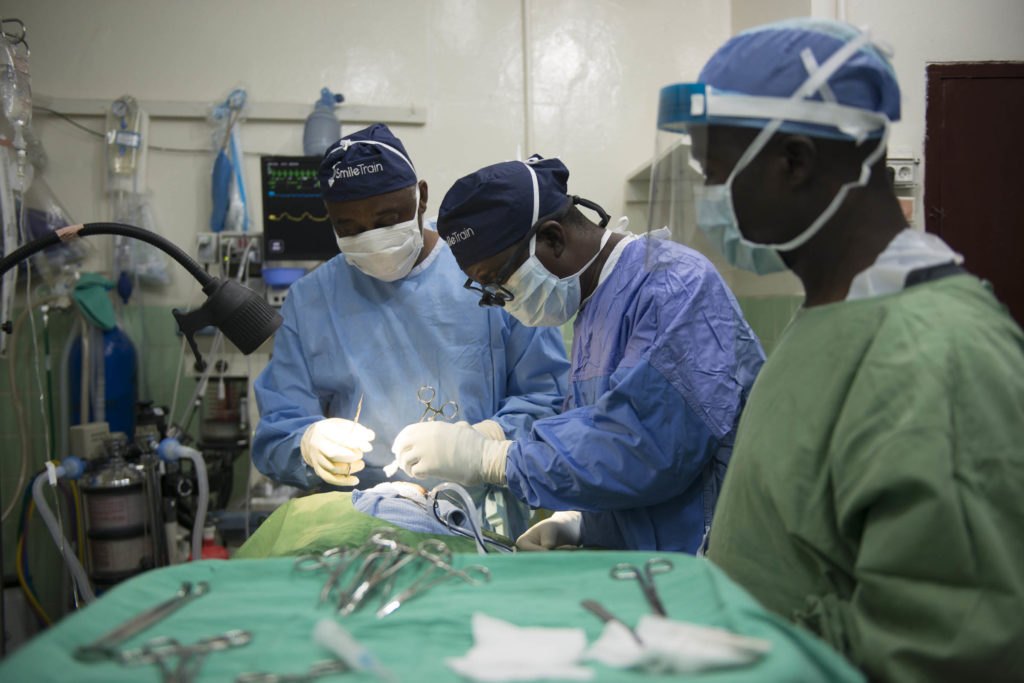
“What we realized from “Cleft Week”, was that due to the Ebola crisis, many of the children who had cleft lip and palate repair before had been operated on by organizations who would do the surgery and then leave. So, for a period of two years, we had no international teams coming to the country, meaning that patients we operated on were already 2 or 3 years of age. In Liberia, there are no plastic surgeons able to do this job and we have a tremendous need to build our resources.
“One benefit we have from the collaboration with Smile Train so far has to do with the capacity building. They have not only given us theoretical knowledge of cleft repair but also hands-on training, from a visiting surgeon. So, after the surgeon left, we were able to do repairs on our own. That is the beauty of Smile Train; to foster our independence so that we can continue the work and give smiles to our children.
“Though we have helped a lot of people already, we continue to have challenges in spreading awareness. Normally, we spread the word through the radio but we haven’t yet used television. Another big challenge is to have people going to different parts of the country to create awareness about what we do but there is the issue of transportation because road conditions are so terrible. I look to the future where I hope we will have a pickup truck to get to rural areas and transport patients.
“Also, I can’t be the only one doing cleft lip and palate repair. This all goes back to the personnel issue we have in finding new surgeons willing to do the task. I hope we can have two or more local doctors, trained to join the team. One strategy we use to make this happen is to contact medical directors of facilities in other parts of the country, asking them to give our number in case they find patients that we can help. For example, this morning I received a call from another hospital, saying that they have five patients for us but the road condition is so terrible that we must wait until the dry season for them to be able to reach us.
“Children with clefts and their parents are stigmatized and many of them don’t want to go to school. It is difficult for parents and some don’t bring their children outside to interact with other children because of their condition. Some even abandon their children or separate from their spouses.
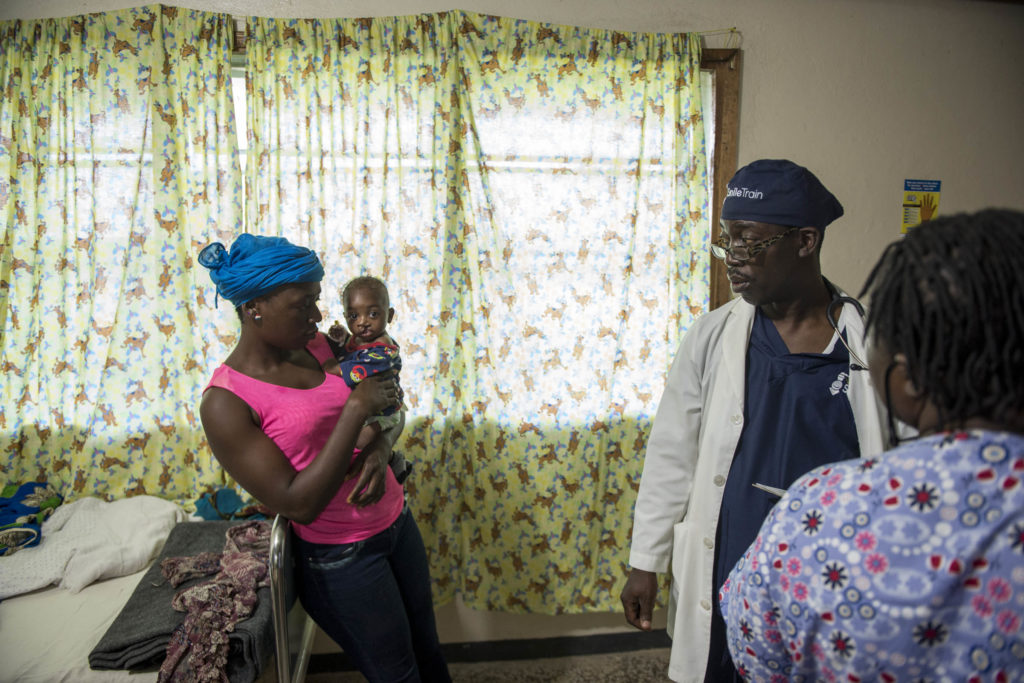
“For people hearing our radio broadcasts, it is unimaginable for them that they could receive cleft lip or palate treatment for free and you need to build trust because otherwise, they won’t come. In this regard, one advantage we have is that the people know me because of my role during the Ebola outbreak. I often do radio broadcasts myself and people respond positively to that. Also, our hospital is well known in Liberia and is one of the oldest mission hospitals here.”
Dr. Ona is a Nigerian, certified Smile Train surgeon, who was brought in by Smile Train to help Dr. Brown and his team perform the first surgeries a few months ago. He is based in Egunu State in Nigeria. “When Dr. Ona left and we had to do the surgery ourselves, there was such jubilation and we were so proud and happy, compared to when Dr. Ona was here because we managed without supervision. We put into practice what we learned and we realized we were going to have more and more of these patients. We felt that this was going to have a lot of impact on the lives of many people.
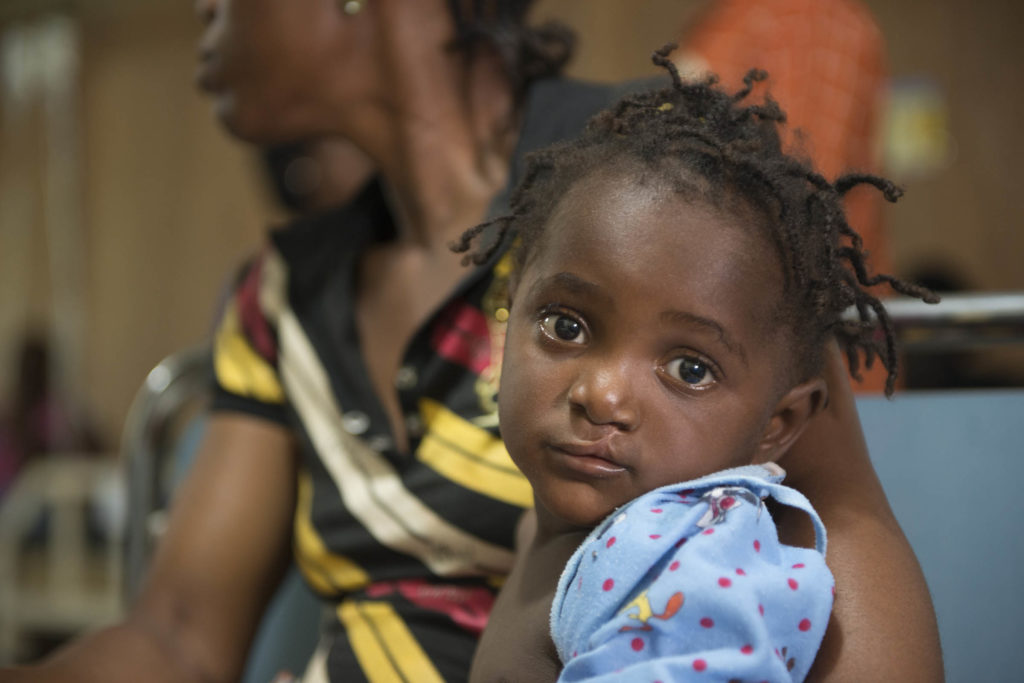
“Another benefit to Smile Train is the attention to safety. They donated a pulse oximeter and a cleft set, something we never had in the past. This will allow us to minimize risk. With the 21 or more surgeries we have done with these new kits, we did not have one complication. Of the 18 patients we operated on in the first week, we had only one cardiac arrest on the table but the patient was resuscitated and survived. Besides that, all other operations went well. Safety is one thing we are very, very cautious about.”
Because of Smile Train’s “Teach a man to fish” model, the training will not end with Dr. Brown. The idea is to identify more young surgeons and that, with time, the skills will be passed on, creating a long-lasting, sustainable system.
“Quite frankly, there are quite a few challenges we have in our country. One thing that hurts me is looking at the patients and having to tell them; you have to go to Nigeria, or to Ghana, or to another country to be treated. I look forward to a day, where we no longer have to refer people to hospitals in other countries for diagnosis and healthcare and can care for them ourselves. I look forward to a day where people are referred to Liberia instead. That is the healthcare system I hope we can build for the future, that is my dream and my prayer for Liberia.” Photos, interviews, and story: Stefano Levi. Text: Emily Young.
